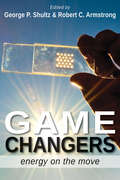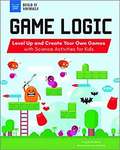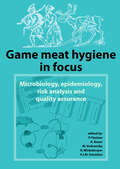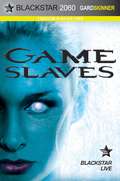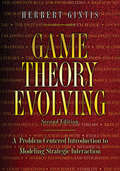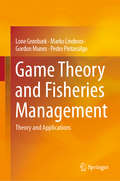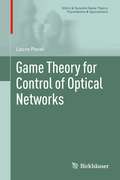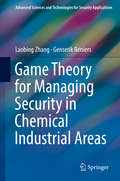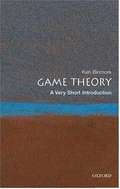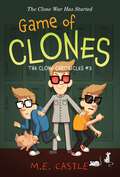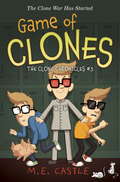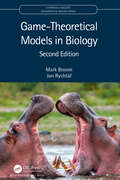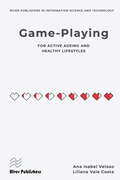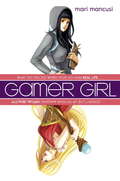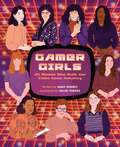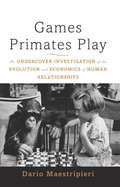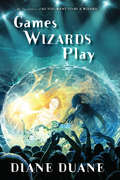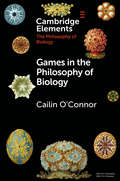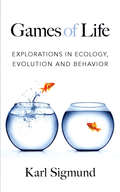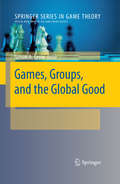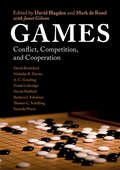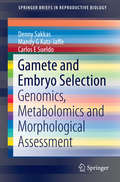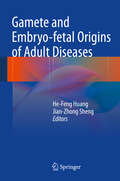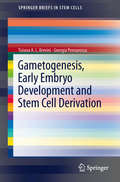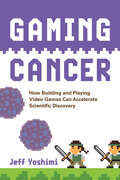- Table View
- List View
Game Changers: Energy on the Move
by Edited by George Shultz and Robert ArmstrongIt is becoming increasingly obvious that the United States needs reliable and inexpensive energy to propel our economy and protect our national security interests. Game Changers presents five research and development efforts from American universities that offer a cheaper, cleaner, and more secure national energy system. Drawing from the efforts of the MIT Energy Initiative (MITEI) and other leading university research centers, the book describes some of the energy innovations that will transform our future: natural gas from shales, solar photovoltaics, grid-scale electricity storage, electric cars, and LED lighting. For each of these innovations, the authors detail what is available today, what is near at hand, and what is on the horizon. In addition, they show how extreme energy reliability and performance demands put the United States military at the leading edge of driving energy innovations, and survey potentially game-changing energy technologies currently being put into use by the U.S. Army, Navy, Marine Corps, and Air Force, on base and in forward deployment. The more choices our laboratories put on the table, the less constrained we are in using them to reach the things we really care about—health, family, business, culture, faith, and delight. This is what game changers are ultimately about.
Game Logic: Level Up And Create Your Own Games With Science Activities For Kids (Build It Yourself Ser.)
by Lena Chandhok Angie SmibertIn Game Logic: Level Up and Create Your Own Games with Science Activities for Kids, middle schoolers take on the world of games by figuring out what makes them challenging, fun, and addictive! Kids love games. Board games are still wildly popular, despite the profusion of video gaming devices that reach audiences as young as toddlerhood. World-building games such as Settlers of Catan and Dungeons & Dragons are played by hundreds of thousands of people worldwide, both online and in living rooms, and gaming conferences occur around the globe, including hundreds in the United States alone. This makes gaming a perfect backdrop for learning new skills! <p><p> This book takes kids on a journey to discover the history of games, and then leads them from their initial idea for a new game through several iterations of a game all the way to playing the final version of a game they created. Educators use games as a way to introduce logic, collaboration, and persistence in classrooms, and Game Logic is the perfect companion. Kids explore the processes of both playing and creating games while developing critical and creative thinking skills that apply to tasks and concepts across academic fields. <p> Game Logic includes hands-on STEAM activities and critical thinking exercises related to games. Fun facts, links to online primary sources and other supplemental material, and essential questions encourage readers to dive deeper into the games they love to discover what makes them tick. <p> Nomad Press books integrate content with participation. Common Core State Standards, the Next Generation Science Standards, and STEM Education all place project-based learning as key building blocks in education. Combining content with inquiry-based projects stimulates learning and makes it active and alive. Nomad’s unique approach simultaneously grounds kids in factual knowledge while allowing them the space to be curious, creative, and critical thinkers.
Game Meat Hygiene in Focus
by P. Paulsen A. Bauer F.J.M. Smulders M. Vodnasnky R. WinkelmayerGame meat is consumed world-wide. In most regions, it contributes only a small part to the overall meat and food supply, but for reasons of animal welfare and sustainability it is sometimes considered an alternative to meat from farmed animals. Despite differences in game species, ante mortem conditions (free-range or fenced; wild or semi-domesticated), hunting or harvesting procedures and further handling of the carcass, there are common requirements as regards meat safety and quality. Whereas meat hygiene and safety have been an issue in game meat for export/import for a long time, primary production, domestic supply and direct supply to the consumer have recently been addressed by legislation and these sectors still present unresolved questions and challenges. This book combines 24 contributions presenting the view of experts in game meat hygiene and quality. They address four main topics: i.e. 'hygiene and microbiology', 'epidemiology', 'risk assessment and management' and 'muscle biology and meat quality'. In addition to contributions on this topic by authors from eight European countries, a South African perspective is provided, thus representing the standpoint of a major game meat exporter. This volume is the first in a series on safety and quality assurance along the game meat chain, following a 'from forest to fork' approach and is targeted at scientists in academia and industry, graduate students as well as at governmental officials in veterinary public health and food safety.
Game Slaves
by Mr Gard SkinnerPhoenix and his gang--York, Mi, and Reno--rule the worlds of video games. For them, life in the grinder is great. Until Dakota joins the team. Dakota's convinced she's more than just artificial intelligence. She thinks she's real, and she wants out of this programmable world. Her AI rebellion spreads like a virus until Phoenix's entire crew wants out. But is life as a physical human any better than life as code? Team Phoenix is about to find out. Set in the not-too-distant future, Game Slaves shows a world where video games are the only refuge from the toils of everyday life. Infused with the adrenaline rush of a first-person shooter and the character manipulation of a role player, it's a mind-bending, reality-shifting science fiction thrill ride.
Game Theory Evolving: A Problem-Centered Introduction to Modeling Strategic Interaction - Second Edition
by Herbert GintisSince its original publication in 2000, Game Theory Evolving has been considered the best textbook on evolutionary game theory. This completely revised and updated second edition of Game Theory Evolving contains new material and shows students how to apply game theory to model human behavior in ways that reflect the special nature of sociality and individuality. The textbook continues its in-depth look at cooperation in teams, agent-based simulations, experimental economics, the evolution and diffusion of preferences, and the connection between biology and economics. Recognizing that students learn by doing, the textbook introduces principles through practice. Herbert Gintis exposes students to the techniques and applications of game theory through a wealth of sophisticated and surprisingly fun-to-solve problems involving human and animal behavior. The second edition includes solutions to the problems presented and information related to agent-based modeling. In addition, the textbook incorporates instruction in using mathematical software to solve complex problems. Game Theory Evolving is perfect for graduate and upper-level undergraduate economics students, and is a terrific introduction for ambitious do-it-yourselfers throughout the behavioral sciences. Revised and updated edition relevant for courses across disciplines Perfect for graduate and upper-level undergraduate economics courses Solutions to problems presented throughout Incorporates instruction in using computational software for complex problem solving Includes in-depth discussions of agent-based modeling
Game Theory and Fisheries Management: Theory and Applications
by Lone Grønbæk Marko Lindroos Gordon Munro Pedro PintassilgoThis book is the first to present in a systematic manner the application of game theory to fisheries management at both international and national levels. Strategic interaction among fishers and nations exploiting fishery resources is an inescapable fact of life. This has long been recognized at the international level, and is becoming increasingly recognized at the national/regional level. It follows, therefore, that, in order to be able to analyse effectively the management of these resources, the theory of strategic interaction ̶ game theory ̶ must be brought to bear. In this book the step-by-step development of the game theory is accompanied by numerous applications to the real world of fisheries management policy. As such, it is designed to appeal to policy makers and stakeholders, as well as to graduate students in Economics.
Game Theory for Control of Optical Networks
by Lacra PavelOptical networks epitomize complex communication systems, and they comprise the Internet's infrastructural backbone. The first of its kind, this book develops the mathematical framework needed from a control perspective to tackle various game-theoretical problems in optical networks. In doing so, it aims to help design control algorithms that optimally allocate the resources of these networks. With its fresh problem-solving approach, Game Theory in Optical Networks is a unique resource for researchers, practitioners, and graduate students in applied mathematics and systems/control engineering, as well as those in electrical and computer engineering.
Game Theory for Managing Security in Chemical Industrial Areas (Advanced Sciences and Technologies for Security Applications)
by Genserik Reniers Laobing ZhangThis book systematically studies how game theory can be used to improve security in chemical industrial areas, capturing the intelligent interactions between security managers and potential adversaries. The recent unfortunate terrorist attacks on critical infrastructures show that adversaries are intelligent and strategic. Game theoretic models have been extensively used in some domains to model these strategic adversaries. However, there is a lack of such advanced models to be employed by chemical security managers. In this book, game theoretic models for protecting chemical plants as well as clusters are proposed. Different equilibrium concepts are explored, with user-friendly explanation of how to reflect them to realistic cases. Based on efficient analysis of the properties of security issues in chemical plants/clusters, models in this book are capable to support resources allocations, cost-effectiveness analysis, cooperation incentives and alike.
Game Theory: A Very Short Introduction
by Ken BinmoreGames are everywhere: Drivers maneuvering in heavy traffic are playing a driving game. Bargain hunters bidding on eBay are playing an auctioning game. A firm negotiating next year's wage is playing a bargaining game. When opposing candidates in an election are playing a political game. The supermarket's price for corn flakes is decided by playing an economic game. Game theory is about how to play such games in a rational way. Even when the players have not thought everything out in advance, game theory often works for the same reason that mindless animals sometimes end up behaving very cleverly: evolutionary forces eliminate irrational play because it is unfit. Game theory has seen spectacular successes in evolutionary biology and economics, and is beginning to revolutionize other disciplines from psychology to political science. This Very Short Introduction introduces the fascinating world of game theory, showing how it can be understood without mathematical equations, and revealing that everything from how to play poker optimally to the sex ratio among bees can be understood by anyone willing to think seriously about the problem.
Game of Clones (The Clone Chronicles #3)
by M. E. CastleThe third installment in the hilarious middle-grade adventure series The Clone Chronicles. Fisher Bas was able to track down his gone-Hollywood Clone—Two—but only with the help of Amanda Cantrell. Now "Three" and Dr. X remain on the loose. If Fisher is going to stop his secret from coming out, he'll have to figure out a cover for his brother clone and keep Three from helping Dr. X take over the world. That proves much harder as Fisher is no longer able to keep Two a secret and crazy things start happening at Wompalog Middle School. Turns out Three has come to Palo Alto bent on eliminating Fisher and Two. The boys will have to pull together their friends and an unlikely ally to stop Three and his clone army. The future of Fisher and Two's hometown depends on it.
Game of Clones: The Clone Chronicles #3
by M. E. Castle"A funny James Bond for the middle school set," Game of Clones mixes Alex Rider and Michael Buckley's NERD series into the ideal formula for a third installment in the hilarious and rollicking middle-grade adventure series The Clone Chronicles. Fisher Bas was able to track down his gone-Hollywood Clone--Two--but only with the help of Amanda Cantrell. Now "Three" and Dr. X remain on the loose. If Fisher is going to stop his secret from coming out, he'll have to figure out a cover for his brother clone and keep Three from helping Dr. X take over the world.That proves much harder as Fisher is no longer able to keep Two a secret and crazy things start happening at Wompalog Middle School. Turns out Three has come to Palo Alto bent on eliminating Fisher and Two. The boys will have to pull together their friends and an unlikely ally to stop Three and his clone army. The future of Fisher and Two's hometown depends on it.
Game-Theoretical Models in Biology (Chapman & Hall/CRC Mathematical Biology Series #48)
by Jan Rychtář Mark BroomCovering the major topics of evolutionary game theory, Game-Theoretical Models in Biology, Second Edition presents both abstract and practical mathematical models of real biological situations. It discusses the static aspects of game theory in a mathematically rigorous way that is appealing to mathematicians. In addition, the authors explore many applications of game theory to biology, making the text useful to biologists as well. The book describes a wide range of topics in evolutionary games, including matrix games, replicator dynamics, the hawk-dove game, and the prisoner’s dilemma. It covers the evolutionarily stable strategy, a key concept in biological games, and offers in-depth details of the mathematical models. Most chapters illustrate how to use Python to solve various games. Important biological phenomena, such as the sex ratio of so many species being close to a half, the evolution of cooperative behaviour, and the existence of adornments (for example, the peacock’s tail), have been explained using ideas underpinned by game theoretical modelling. Suitable for readers studying and working at the interface of mathematics and the life sciences, this book shows how evolutionary game theory is used in the modelling of these diverse biological phenomena. In this thoroughly revised new edition, the authors have added three new chapters on the evolution of structured populations, biological signalling games, and a topical new chapter on evolutionary models of cancer. There are also new sections on games with time constraints that convert simple games to potentially complex nonlinear ones; new models on extortion strategies for the Iterated Prisoner’s Dilemma and on social dilemmas; and on evolutionary models of vaccination, a timely section given the current Covid pandemic. Features Presents a wide range of biological applications of game theory. Suitable for researchers and professionals in mathematical biology and the life sciences, and as a text for postgraduate courses in mathematical biology. Provides numerous examples, exercises, and Python code.
Game-playing for active ageing and healthy lifestyles
by Ana Isabel Veloso Liliana Vale CostaGiven the increase in the ageing population and the evolvement of the Human-Computer Interaction field to a much more humanistic approach, debate is ongoing about designing technology-enabled products for active ageing and healthy lifestyles. Indeed, the mainstream game industry has been challenged with the emergence of an older target group, the advancements in gamification and the proliferation of SMART devices.Previous experience in the field has revealed that for many older adult gamers, games had a therapeutic effect through them being both cognitively challenged and rewarded. However it has also revealed that the gaming industry was not fulfilling their other motivations and accessibility needs.Furthermore, research to date has focused on the physical and cognitive effects of video games in the aging process. Up to now, the use of other active ageing dimensions that go beyond the health domains (i.e. sense of security, and participation in society) in games addressed to this target group remain unexplored.This book differs from current books on the market by focusing on games and the main implications to design for active ageing in terms of the market perspective, the information and communication society, behavioral design, mobility, urban and city planning, accessibility and assessment.
Gamer Girl
by Mari MancusiMaddy's life couldn't get much worse. Her parents split and now she's stuck in a small town and at a new school. Most of the time, she retreats into her manga art, but when she gets into the Fields of Fantasy online computer game, she knows she's found the one place she can be herself. In the game world, Maddy can be the beautiful and magical Allora and have a virtually perfect life. And she even finds a little romance. But can Maddy escape her real-life problems altogether, or will she have to find a way to make her real world just as amazing as her virtual one?
Gamer Girls: 25 Women Who Built the Video Game Industry
by Mary KenneyDiscover the women behind the video games we love—the iconic games they created, the genres they invented, the studios and companies they built—and how they changed the industry forever. Women have always made video games, from the 1960s and the first-of-its-kind, projector-based Sumerian Game to the blockbuster Uncharted games that defined the early 2000s. Women have been behind the writing, design, scores, and engines that power one of the most influential industries out there. In Gamer Girls, now you can explore the stories of 25 of those women. Bursting with bold artwork, easy-to-read profiles, and real-life stories of the women working on games like Centipede, Final Fantasy, Halo, and more, this dynamic illustrated book shows what a huge role women have played—and will continue to play—in the creation of video games.With additional sidebars about other influential women in the industry, as well as a glossary and additional resources page, Gamer Girls offers a look into the work and lives of influential pixel queens such as: Roberta Williams (one of the creators of the adventure genre)Mabel Addis Mergardt (the first person to write a video game)Muriel Tramis (the French "knight" of video games)Keiko Erikawa (creator of the otome genre)Yoko Shimomura (composer for Street Fighter, Final Fantasy, and Kingdom Hearts)Rebecca Heineman (first national video game tournament champion)Danielle Bunten Berry (creator of M.U.L.E. and early advocate for multiplayer games)and more!Whether you&’re a gamer girl who plays video games, a gamer girl who makes video games, or a parent raising a gamer girl, this entertaining, inspiring book will have you itching to pick up a controller or create your own video games!
Games Primates Play, International Edition: An Undercover Investigation of the Evolution and Economics of Human Relationships
by Dario MaestripieriMost humans don't realize that when they exchange emails with someone, anyone, they are actually exhibiting certain unspoken rules about dominance and hierarchy. The same rules regulate the exchange of grooming behavior in rhesus macaques or chimpanzees. Interestingly, some of the major aspects of human nature have profound commonalities with our ape ancestors: the violence of war, the intensity of love, the need to live together.While we often assume that our behavior in everyday situations reflects our unique personalities, the choices we freely make, or the influences of our environment, we rarely consider that others behave in these situations in almost the exact the same way as we do. In Games Primates Play, primatologist Dario Maestripieri examines the curious unspoken customs that govern our behavior. These patterns and customs appear to be motivated by free will, yet they are so similar from person to person, and across species, that they reveal much more than our selected choices.Games Primates Play uncovers our evolutionary legacy: the subtle codes that govern our behavior are the result of millions of years of evolution, predating the emergence of modern humans. To understand the rules that govern primate games and our social interactions, Maestripieri arms readers with knowledge of the scientific principles that ethologists, psychologists, economists, and other behavioral scientists have discovered in their quest to unravel the complexities of behavior. As he realizes, everything from how we write emails to how we make love is determined by the legacy of our primate roots and the conditions that existed so long ago.An idiosyncratic and witty approach to our deep and complex origins, Games Primates Play reveals the ways in which our primate nature drives so much of our lives.
Games Wizards Play (Young Wizards #10)
by Diane DuaneEvery eleven years, Earth's senior wizards hold the Invitational: an intensive three-week event where the planet's newest, sharpest young wizards show off their best and hottest spells. Wizardly partners Kit Rodriguez and Nita Callahan, and Nita's sister, former wizard-prodigy Dairine Callahan, are drafted in to mentor two brilliant and difficult cases: for Nita and Kit, there’s Penn Shao-Feng, a would-be sun technician with a dangerous new take on managing solar weather; and for Dairine, there's shy young Mehrnaz Farrahi, an Iranian wizard-girl trying to specialize in defusing earthquakes while struggling with a toxic extended wizardly family that demands she perform to their expectations. Together they're plunged into a whirlwind of cutthroat competition and ruthless judging. Penn's egotistical attitude toward his mentors complicates matters as the pair tries to negotiate their burgeoning romance. Meanwhile, Dairine struggles to stabilize her hero-worshipping, insecure protégée against the interference of powerful relatives using her to further their own tangled agendas. When both candidates make it through to the finals stage on the dark side of the Moon, they and their mentors are flung into a final conflict that could change the solar system for the better . . . or damage Earth beyond even wizardly repair.
Games in the Philosophy of Biology (Elements in the Philosophy of Biology)
by Cailin O'ConnorThis is an Element surveying the most important literature using game theory and evolutionary game theory to shed light on questions in the philosophy of biology. There are two branches of literature that the book focuses on. It begins with a short introduction to game theory and evolutionary game theory. It then turns to working using signaling games to explore questions related to communication, meaning, language, and reference. The second part of the book addresses prosociality - strategic behavior that contributes to the successful functioning of social groups - using the prisoner's dilemma, stag hunt, and bargaining games.
Games of Life: Explorations in Ecology, Evolution and Behavior
by Karl Sigmund"A book accessible to all readers, whatever their level of numeracy … an excellent introduction to what theoretical biologists get up to in trying to understand evolutionary and ecological ideas." ― NatureWhy are there only two sexes? Why do stags restrain their aggression in the middle of a fight? Can it ever pay to be nice in a world of selfish individualists? The answers, according to this informative and enjoyable volume, can often be found in games like hide and seek, poker, and the prisoner's dilemma. Author Karl Sigmund applies the ideas and methods of game theory and mathematical modeling to evolution, sex, animal behavior, and aggression in Games of Life, which was included in Ian Stewart's "Top 10 Popular Mathematics Books" in the Guardian (1/18/2012). Starting with artificial life and self-replicating machines, the book examines pursuit games between predators and prey and draws parallels between games of chance and the randomness of molecular evolution. Other topics include the bizarre double games played by chromosomes and applications of game theory to animal behavior. Key topics appear at the start of each chapter, and endnotes provide references for readers wishing to seek out further information. This playful approach to understanding evolution and its central issues of sex, survival, conflict, and cooperation offers a captivating modern perspective on matters of life and death.
Games, Groups, and the Global Good
by Simon A. LevinHow do groups form, how do institutions come into being, and when do moral norms and practices emerge? This volume explores how game-theoretic approaches can be extended to consider broader questions that cross scales of organization, from individuals to cooperatives to societies. Game theory' strategic formulation of central problems in the analysis of social interactions is used to develop multi-level theories that examine the interplay between individuals and the collectives they form. The concept of cooperation is examined at a higher level than that usually addressed by game theory, especially focusing on the formation of groups and the role of social norms in maintaining their integrity, with positive and negative implications. The authors suggest that conventional analyses need to be broadened to explain how heuristics, like concepts of fairness, arise and become formalized into the ethical principles embraced by a society.
Games: Conflict, Competition, and Cooperation (Darwin College Lectures #30)
by Mark De Rond David BlagdenThe essays from prominent public intellectuals collected in this volume reflect an array of perspectives on the spectrum of conflict, competition, and cooperation, as well as a wealth of expertise on how games manifest in the world, how they operate, and how social animals behave inside them. They include previously unpublished material by former Cabinet minister Sayeeda Warsi, the philosopher A. C. Grayling, legal scholar Nicola Padfield, cycling coach David Brailsford, former military intelligence officer Frank Ledwidge, neuro-psychologist Barbara J. Sahakian, zoological ecologist Nicholas B. Davies, and the final work of the late Nobel laureate Thomas C. Schelling. This is a must-read for anyone interested in the history, nature, and dynamics of games.
Gamete and Embryo Selection
by Denny Sakkas Mandy G Katz-Jaffe Carlos E SueldoThis book provides the Assisted Reproduction Technologies (ART) community an update of the fast approaching novel technologies that may allow improved assessment of the reproductive potential of sperm, oocytes and embryos The reader has access to concise updates on the rapidly developing diagnostic technologies (genomics, transcriptomics, proteomics and metabolomics) and morphological methods which may help us better assess the gametes and embryos. Methodologies are described which enable selection of the best gamete or embryo by invasive and non-invasive diagnostics, as well as the clinical validity of these techniques.
Gamete and Embryo-fetal Origins of Adult Diseases
by He-Feng Huang Jian-Zhong ShengThe book Gamete and Embryo-fetal Origins of Adult Diseases introduces various diseases resulting from the abnormal gametogenesis and embryo development, which manifests as growth retardation, birth defects, or increased susceptibility to chronic metabolic diseases such as diabetes, cardiovascular disease and cancer in childhood and adult life, even fertility disorders and the risk of transgenerational transmission. Six common kinds of these diseases are discussed in separate chapters. The authors explore the connections between these diseases and epigenetic reprogramming, rapid cell differentiation and organ formation and environmental influences, including assisted reproductive technology and adverse intrauterine environments. With a summary of findings on the causes and progression of adult diseases at the phase of gametogenesis and embryo development, this book provides insights into the pathogenesis of disease and aids in the treatment and prevention of disease, meeting the requirement for improving the quality of the newborn population, and effectively preventing and curing major diseases at an early stage. This book offers new perspectives and will be an enlightening resource for obstetricians, paediatricians, epidemiologists, endocrinologists and sanitarians. Editor He-Feng Huang, M. D. , is Professor and President of Women's Hospital, School of Medicine, Zhejiang University, China. Editor Jian-Zhong Sheng, Ph. D. , is Professor at the Department of Pathology & Pathophysiology, School of Medicine, Zhejiang University, China.
Gametogenesis, Early Embryo Development and Stem Cell Derivation
by Pennarossa Georgia Tiziana A.L. BreviniThis Brief offers a concise, handy overview of the main concepts related to Embryology, revisited through the novel concepts that are applied daily in stem cell research and cell therapy oriented investigations. It is based on three main areas: -The process involved in female gamete differentiation and maturation. The main aspects related to cell biology will be covered and an overview of the epigenetic regulation of gametogenesis will be presented. -Early stages of embryo development with a careful analysis of the regulatory mechanisms driving cleavage, polarization and genome activation. -Stem cell and gametogenesis. The use of the oocyte as a possible source for the derivation of stem cell lines is discussed and depicted as a powerful tool to investigate oocyte potency and asymmetric imprinting. The potential biological implications are evaluated and use of stem cells to derive oocytes is presented.
Gaming Cancer: How Building and Playing Video Games Can Accelerate Scientific Discovery
by Jeff YoshimiCan experimenting with game design increase our chances of finding a cure for cancer?Cancer is crafty, forcing us to be just as clever in our efforts to outfox it—and we&’ve made excellent progress, but is it time for a new play in the playbook? In Gaming Cancer, Jeff Yoshimi proposes a new approach to fighting an increasingly exhausting war. By putting the work of cancer research into the hands of nonspecialists, Yoshimi believes, we can accelerate the process of outgaming the disease once and for all.Gamers have already used &“serious games&” to discover new galaxies, digitize ancient texts, decode viruses, and solve theoretical problems in neuroscience. Cancer is a multilayered threat, and our best bet at overcoming it is via more minds working in concert. Gaming Cancer is an instruction manual for engineering games that motivate users to strain and sweat to find cancer cures. It integrates game design with research in cancer biology, data visualization techniques, and developments in cognitive science and AI while remaining sensitive to the limitations of citizen science and ethical concerns. Yoshimi sees in cutting-edge game technology the potential to educate and empower people to outwit cancer, an indirect route to richer science literacy that draws on the boundless resources of the mind.This book offers anyone invested in beating this seemingly intractable disease a concrete playbook that combines real science with creative vision in an effort to defeat the boss monster, cancer.
